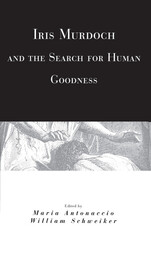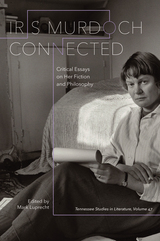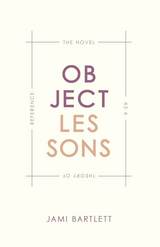3 books about Murdoch, Iris

Iris Murdoch and the Search for Human Goodness
Edited by Maria Antonaccio and William Schweiker
University of Chicago Press, 1996
A noted philosopher and one of the most gifted and prolific novelists of the twentieth century, Iris Murdoch has anticipated and shaped many of the issues central to current ethics. These include the relation between human identity and ideas of the good, the effect of the modern critique of religion on moral thought, the relation between ethics and literature, and the contemporary debate about liberalism. In the most comprehensive engagement with Murdoch's work to date, this volume gathers contributions from philosophers, theologians, and a literary critic to explore the significance of her ideas for contemporary thought.
Inspired by Murdoch's tenacious wrestling with basic questions of human existence, these essays not only clarify her thoughts on human goodness, but also move beyond the academy to reflect on how we can and ought to undertake the human adventure in our daily lives.
Contributors are Charles Taylor, Martha Nussbaum, David Tracy, Cora Diamond, Maria Antonaccio, Elizabeth Dipple, Franklin I. Gamwell, Stanley Hauerwas, and William Schweiker. This volume also includes "Metaphysics and Ethics," a classic essay by Iris Murdoch.
Inspired by Murdoch's tenacious wrestling with basic questions of human existence, these essays not only clarify her thoughts on human goodness, but also move beyond the academy to reflect on how we can and ought to undertake the human adventure in our daily lives.
Contributors are Charles Taylor, Martha Nussbaum, David Tracy, Cora Diamond, Maria Antonaccio, Elizabeth Dipple, Franklin I. Gamwell, Stanley Hauerwas, and William Schweiker. This volume also includes "Metaphysics and Ethics," a classic essay by Iris Murdoch.
[more]

Iris Murdoch Connected
Critical Essays on Her Fiction and Philosophy
Mark Luprecht
University of Tennessee Press, 2014
This volume compiles twelve essays that reflect the surging interest in the Irish-born author Iris Murdoch as both a writer and philosopher. Beyond her impressive body of philosophical works, Murdoch produced twenty-six novels, several plays, and numerous poems, short stories, and essays during her multifaceted career. The prolific novelist-philosopher has drawn attention from scholars in multiple disciplines, which reflects her range of interests as well as the accessibility of her work from varied perspectives.
The first part of the collection focuses on Murdoch’s literary works and approach to art. Frances White’s opening essay examines the influence of Virginia Woolf on Murdoch, while Elaine Morley deals with attention and “unselfing” in the writer’s works. Much can be learned from Murdoch’s letters, as Miles Leeson and Anne Rowe demonstrate in their respective contributions. David James explores Murdoch’s influence on fellow Irish writer John Banville. Finally, Pamela Osborn and Rivka Isaacson offer vastly different perspectives on Murdoch’s fourth novel, The Bell, in the two essays that round out the literature-centric half of the collection.
Part two highlights concepts in and approaches to Murdoch’s philosophical thought. Tony Milligan writes of the meanings of puritanism and truthfulness in Murdoch’s philosophical writings and essays and in her novel A Fairly Honourable Defeat. Julián Jiménez Heffernan’s contribution centers on Murdoch’s confrontation with the notion of contingency. Using the philosophical lens of metaxu, Kate Larson suggests a new approach to Murdoch’s thought by looking at it in relation to that of Simone Weil. Paul Martens locates the similarities of structure in Murdoch’s The Black Prince and Søren Kierkegaard’s Fear and Trembling. Lastly, Matthew Martinuk delves into the affinity of thought between Charles Taylor and Murdoch.
By examining both Murdoch’s influences and those she has influenced, Iris Murdoch Connected constructs complex new understandings of this formidable writer’s vast contributions to literature and philosophy.
The first part of the collection focuses on Murdoch’s literary works and approach to art. Frances White’s opening essay examines the influence of Virginia Woolf on Murdoch, while Elaine Morley deals with attention and “unselfing” in the writer’s works. Much can be learned from Murdoch’s letters, as Miles Leeson and Anne Rowe demonstrate in their respective contributions. David James explores Murdoch’s influence on fellow Irish writer John Banville. Finally, Pamela Osborn and Rivka Isaacson offer vastly different perspectives on Murdoch’s fourth novel, The Bell, in the two essays that round out the literature-centric half of the collection.
Part two highlights concepts in and approaches to Murdoch’s philosophical thought. Tony Milligan writes of the meanings of puritanism and truthfulness in Murdoch’s philosophical writings and essays and in her novel A Fairly Honourable Defeat. Julián Jiménez Heffernan’s contribution centers on Murdoch’s confrontation with the notion of contingency. Using the philosophical lens of metaxu, Kate Larson suggests a new approach to Murdoch’s thought by looking at it in relation to that of Simone Weil. Paul Martens locates the similarities of structure in Murdoch’s The Black Prince and Søren Kierkegaard’s Fear and Trembling. Lastly, Matthew Martinuk delves into the affinity of thought between Charles Taylor and Murdoch.
By examining both Murdoch’s influences and those she has influenced, Iris Murdoch Connected constructs complex new understandings of this formidable writer’s vast contributions to literature and philosophy.
[more]

Object Lessons
The Novel as a Theory of Reference
Jami Bartlett
University of Chicago Press, 2016
Object Lessons explores a fundamental question about literary realism: How can language evoke that which is not language and render objects as real entities? Drawing on theories of reference in the philosophy of language, Jami Bartlett examines novels by George Meredith, William Makepeace Thackeray, Elizabeth Gaskell, and Iris Murdoch that provide allegories of language use in their descriptions, characters, and plots. Bartlett shows how these authors depict the philosophical complexities of reference by writing through and about referring terms, the names and descriptions that allow us to “see” objects. At the same time, she explores what it is for words to have meaning and delves into the conditions under which a reference can be understood. Ultimately, Object Lessons reveals not only how novels make references, but also how they are about referring.
[more]
READERS
Browse our collection.
PUBLISHERS
See BiblioVault's publisher services.
STUDENT SERVICES
Files for college accessibility offices.
UChicago Accessibility Resources
home | accessibility | search | about | contact us
BiblioVault ® 2001 - 2024
The University of Chicago Press









